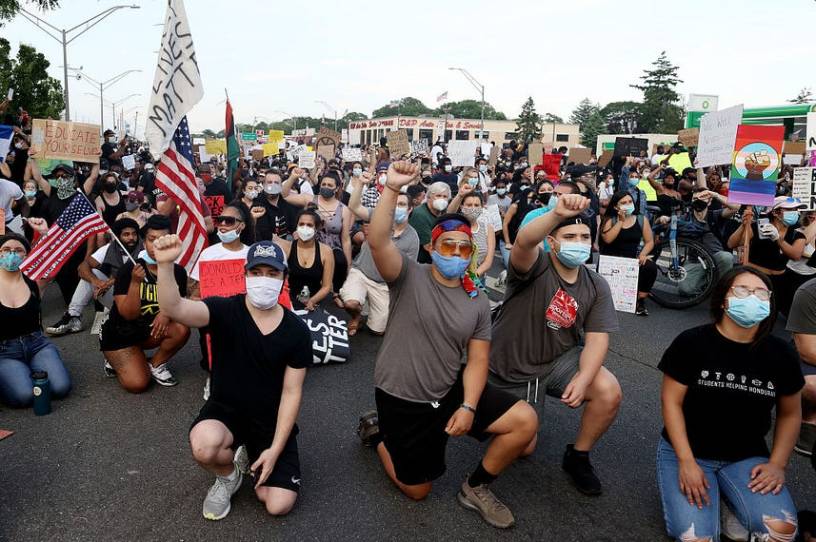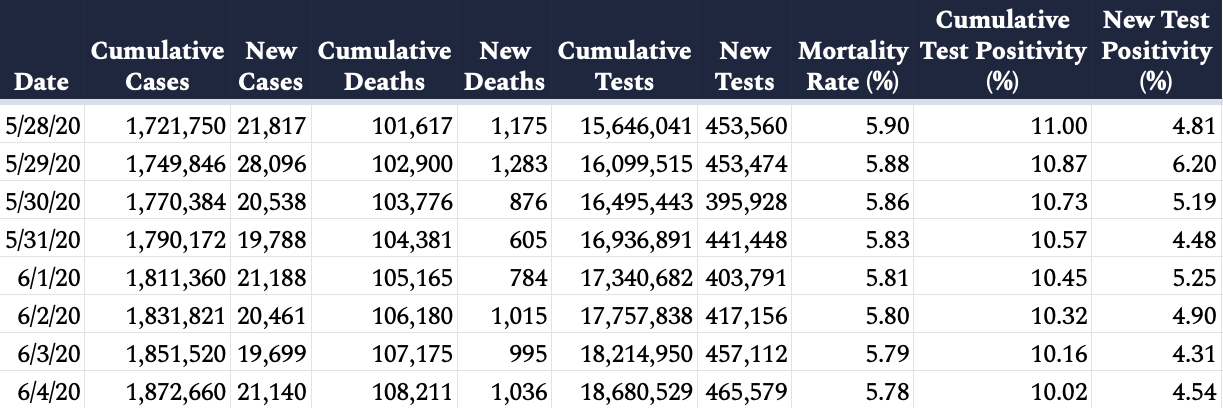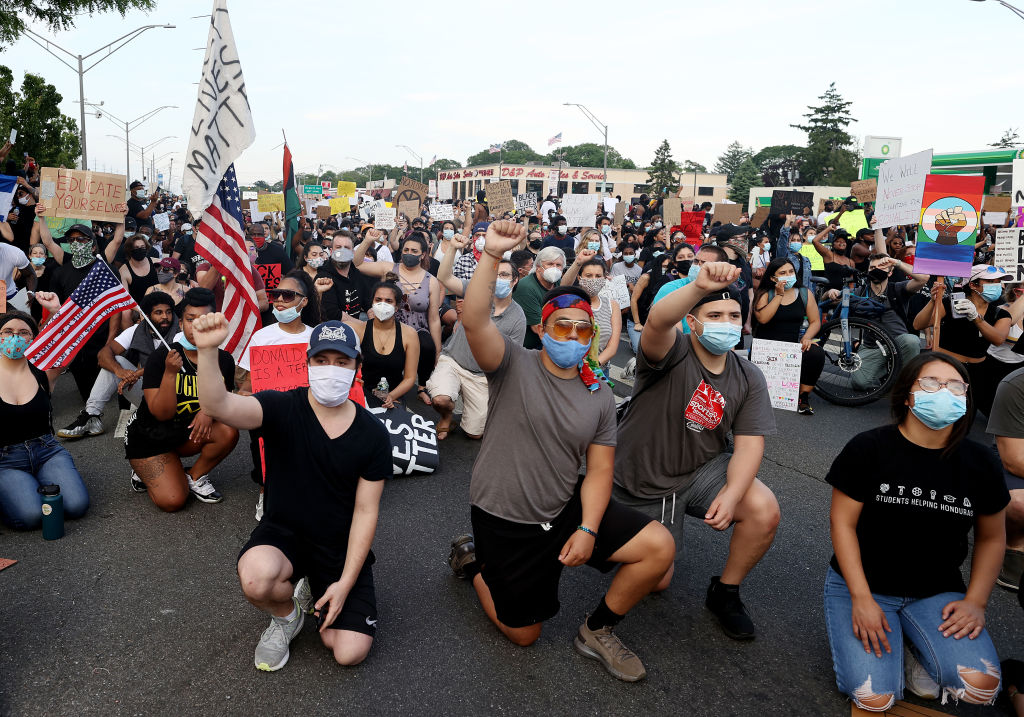The Morning Dispatch: Are American Attitudes on Race Changing?

Happy Friday. Things remain rough out there, but look at it this way: We’ve made it through March, April, May, and the first week of June, all of which were insane for their own insane reasons. At this point, what can’t America handle?
Thanks to our members who joined us for the latest Dispatch Live event last night. It was a lively, entertaining, and at times very emotional conversation. If you missed it or want to rewatch it, here’s a link. The password is “dingo.”
Quick Hits: Today’s Top Stories
As of Thursday night, 1,872,660 cases of COVID-19 have been reported in the United States (an increase of 21,140 from yesterday) and 108,211 deaths have been attributed to the virus (an increase of 1,036 from yesterday), according to the Johns Hopkins University COVID-19 Dashboard, leading to a mortality rate among confirmed cases of 5.8 percent (the true mortality rate is likely much lower, between 0.4 percent and 1.4 percent, but it’s impossible to determine precisely due to incomplete testing regimens). Of 18,680,529 coronavirus tests conducted in the United States (465,579 conducted since yesterday), 10 percent have come back positive.


In a break from the Republican Party line, Sen. Lisa Murkowski (R-Alaska) called James Mattis’ denunciation of Trump “true, honest, necessary, and overdue,” and said she was “struggling” with whether or not to support the president in 2020. Trump subsequently took to Twitter to say that he would campaign against Murkowski during her next reelection bid in 2022.
Senator Chuck Grassley (R-Iowa) announced that he will block the nominations of two potential Trump administration officials—Christopher C. Miller for director of the National Counterterrorism Center and Marshall Billingslea for undersecretary for arms control and international security at the State Department—until the administration offers an explanation for its recent firing of two inspectors general.
The NBA has officially approved a 22-game format to restart the 2019-2020 season. The season will begin on July 31 in Orlando, Florida.
A widely cited study showing that chloroquine and hydroxychloroquine have potentially fatal health consequences has been retracted, with three out of its four authors saying they could “no longer vouch for the veracity of the primary data sources.”
Michael R. White, an American Navy veteran who had been imprisoned in Iran for nearly two years, was released on Thursday as part of a prisoner exchange between the two countries.
Another 1.9 million Americans filed for unemployment last week, according to the US Department of Labor.
In a eulogy at George Floyd’s funeral, Rev. Al Sharpton announced a march in Washington, D.C scheduled for August 28, which will mark the 57th anniversary of the historic March on Washington that featured Martin Luther King’s famous speech at the Lincoln Memorial.
New testimony at a hearing for Ahmaud Arbery’s killers revealed that Travis McMichael, the man who fatally shot Arbery in February, used a racial epithet after pulling the trigger. New body camera footage also shows a Confederate flag sticker on McMichael’s truck.
While speaking to a group of African American supporters, Joe Biden said “10 to 15 percent” of Americans “are just not very good people,” later adding the caveat that “the vast majority of the people are decent.”
‘Recognize That Just Because You Do Not Feel the Pain, the Anguish of Another, Does Not Mean It Does Not Exist’

“The protests are defined by tens of thousands of people of conscience who are insisting that we live up to our values,” former Defense Secretary James Mattis wrote this week. “Our values as people and our values as a nation.”
But at the same time, we have witnessed a country that is becoming increasingly divided—by our own facts, our own terms, and our own experience.
A CBS poll released this week compared attitudes about race over time. More than 80 percent of Americans now believe black Americans are discriminated against, with half the country believing they face “a lot” of discrimination. In 2014, nearly eight in 10 Americans said they believed there had been real progress ending that discrimination. That number has now dropped almost 25 points to just more than half. In 2015, 55 percent of white Americans believed blacks and whites had an equal chance to get ahead. Just five years later, that number has dropped by 10 points.
Perhaps these are bleak numbers—pessimism is growing about the racial divide in America. But viewed from another angle, we are coming together in agreement—views on existing racism are becoming more broadly shared across different races.
This all culminates in our national conversation about systemic—or structural, or institutional—racism. There’s no one easy definition of these terms, but this, from the Aspen Institute, may be a helpful starting point:
A system in which public policies, institutional practices, cultural representations, and other norms work in various, often reinforcing ways to perpetuate racial group inequity … Structural racism is not something that a few people or institutions choose to practice. Instead it has been a feature of the social, economic and political systems in which we all exist.
For a lot of people, the question then becomes, is there any evidence to back up this idea that the institutions of our country—and more specifically police departments—are inherently, if unconsciously, racist?
To take one example relevant to the news of the day, consider this chart, run under the headline: “Minneapolis Police Use Force Against Black People at 7 Times the Rate of Whites.”

As of 2016, data from the historical Survey of Consumer Finances found “you would have to combine the net worth of 11.5 black households to get the net worth of a typical white U.S. household.”
As we’ve written about before, the racial health disparities in motherhood are stark. “Even accounting for income, education, health problems, and potential genetic differences, black mothers are still significantly more likely to die or have severe complications in childbirth than their white counterparts,” we wrote in April. “One particularly disturbing 2016 study out of New York City, for example, ‘found that black, college-educated mothers who gave birth in local hospitals were more likely to suffer severe complications of pregnancy or childbirth than white women who never graduated from high school.’”
The inequities can seem staggering. But then others will point to data that suggests the opposite. Heather MacDonald of the Manhattan Institute published this in the Wall Street Journal earlier this week:
African-Americans were about a quarter of those killed by cops last year (235), a ratio that has remained stable since 2015. That share of black victims is less than what the black crime rate would predict, since police shootings are a function of how often officers encounter armed and violent suspects. In 2018, the latest year for which such data have been published, African-Americans made up 53% of known homicide offenders in the U.S. and commit about 60% of robberies, though they are 13% of the population … a police officer is 18½ times more likely to be killed by a black male than an unarmed black male is to be killed by a police officer.
A Michigan State University study found that white police officers were no more likely to shoot black suspects, and research from economist Roland Fryer found that while black people were “more likely to be touched, handcuffed, pushed to the ground or pepper-sprayed by a police officer … when it comes to … police shootings — the study finds no racial bias.”
As is so often the case, data can be used just as much to obfuscate as to clarify, depending on how you come to the question in the first place.
So where does that leave the debate on systemic racism?
It’s worth listening to those who have had a different experience in this country and listening to those who may not be our neighbors or friends. Some Americans who have achieved great things are still telling us that there is a deep and real problem.
“We simply must acknowledge that society is not color-blind and probably never will be,” Condoleezza Rice—President George W. Bush’s secretary of state—wrote this week. “To be black is to be forced to overcome implicit and explicit reactions to the color of your skin. It might be dismissiveness or underestimation or presumption of how you think. In some circumstances, it might be fear. We encounter these responses even among decent people who sincerely do not want to react that way.”
Tim Scott—the only black Republican in the Senate (and the lone African American ever to serve in both chambers of Congress)—gave an impassioned speech on this subject a few years ago, detailing his own experience being pulled over seven times in a single year. “I have felt the anger, the frustration, the sadness, and the humiliation that comes with feeling like you’re being targeted for nothing more than being just yourself,” he said. “Recognize that just because you do not feel the pain, the anguish of another, does not mean it does not exist.”
The entire speech is worth watching, here.
Gen. Mattis’ Shock Wave
We wrote to you yesterday about Gen. James Mattis’ bombshell of a statement—provided to The Atlantic Wednesday evening—denouncing President Trump’s leadership. The news blocked out the sun in the nation’s capital, for reasons we laid out: Mattis served as Trump’s defense secretary for two years, and “was in regular meetings with the president, discussing the most sensitive and important matters of national security with the commander-in-chief.” More importantly, for our purposes today, is that Mattis was “saying in public what many Republican elected officials say in private.”
Because word of Mattis’ opprobrium dropped Wednesday night, Thursday immediately became an RSCDWN, or Republican Senate Communications Director’s Worst Nightmare. It was one of those days where all the reporters on the Hill run around and ask GOP elected officials the same question: Will you condemn the president’s ___________?
Lisa Murkowski of Alaska accepted the challenge. “I thought Gen. Mattis’ words were true, and honest, and necessary, and overdue,” she told reporters. “I felt like perhaps we are getting to a point where we can be more honest with the concerns that we might hold internally—and have the courage of our own convictions to speak up.”
The air was let out of that balloon rather quickly. Ted Cruz “didn’t see what [Mattis] said.” Joni Ernst and Tom Cotton declined to comment. “I think that’s one individual’s view,” Mike Braun argued. “I don’t think that’s going to make a difference like some have talked about in terms of being the straw that breaks the camel’s back, so to speak. … How many times have we heard that?”
Some, like Marco Rubio, Thom Tillis, and James Inhofe, praised Gen. Mattis while discrediting his assessment of the president. “Those aren’t my words. That’s not the way I would describe what is a very difficult time in our country,” Rubio made clear. Inhofe speculated sour grapes may be playing a role in recent events. “Once you’re fired, sometimes that affects your attitude,” he said, amplifying a false claim Trump has made about dismissing Mattis.
A few others flicked some stylistic recommendations in the general direction of the White House. “I don’t think he’s trying to divide,” Mike Rounds said. “But sometimes … because of the approach that’s taken, the message he’s trying to get across something gets lost.”
“The question is tone and words, and I think some of the tones and some of the words used should be focused more on healing and less on dividing,” Rob Portman noted.
But outside the halls of Congress, Mattis continues to rack up more full-throated defenders.
“The president did not fire him. He did not ask for his resignation,” Trump’s former chief of staff, John Kelly, told the Washington Post, correcting a Trump tweet on Mattis. “The president has clearly forgotten how it actually happened or is confused. … Jim Mattis is a honorable man.”
“It is both wrong and dangerous to threaten to deploy American soldiers against American citizens unless there is a complete breakdown of law and order in a state and the governor requests that assistance,” former Clinton administration Defense Secretary William Perry told Politico. “And yet President Trump has repeatedly threatened to do just that against demonstrators, the vast majority of whom are peacefully exercising their constitutional rights for the redress of very real grievances. … America is not a ‘battlespace.’ And the people he threatens to dominate are American citizens, not enemy combatants.”
Martin Dempsey, a former chairman of the Joint Chiefs of Staff, concurred. “America is not a battleground,” he tweeted. “Our fellow citizens are not the enemy.”
“I have to date been reticent to speak out on issues surrounding President Trump’s leadership,” Mike Mullen, also a former Joints Chiefs chairman, wrote in The Atlantic. “But we are at an inflection point, and the events of the past few weeks have made it impossible to remain silent.”
Worth Your Time
After two full weeks of protests following the death of George Floyd, it’s fair to say some observers are beginning to get a sense of now what? Demonstrators have proven beyond a doubt that ending police brutality is a cause with incredible enthusiasm behind it in America—but once the protests end, what sort of actual changes to the world do they hope to see? This piece in The Atlantic, written by a law professor and a criminology professor from the University of South Carolina and the former deputy chief of the Irvine Police Department, offers several concrete proposals, from ending qualified immunity to pouring more money into rigorous police training to creating and standardizing a system for “better data collection about what the police do and how they do it.”
The riots have largely ended, but the devastation remains. This Wall Street Journal feature by Scott Calvert and Ruth Simon reports on the horrible plight of a number of minority-owned mom-and-pop stores along Philadelphia’s 52nd Street corridor, where—much like what happened in Washington, DC, in 1968, as Declan wrote about yesterday—businesses were hammered by rampant vandalism and looting over the last week.
Presented Without Comment
Also Presented Without Comment
Toeing the Company Line
Tune in to yesterday’s episode of Advisory Opinions for a deep dive into the legal and political nuances of using the military to quell riots. Plus, James Mattis’ rebuke of Trump, Tom Cotton’s controversial New York Times op-ed and an important discussion of “The Last Dance.”
Up at the site today, Andrew has a new piece examining the possibility of mass protests leading to a spike in new COVID cases over the next two weeks. In the last few months, he writes, we’ve learned that “the risk of outdoor transmission in particular appears to be lower than many had initially feared. But we’ve yet to check that theory with anything close to the sort of nationwide stress test the Floyd protests present.”
The rumors of Lego law enforcement’s death were greatly exaggerated. Lego Group’s alleged removal of products featuring police and other emergency response services caused significant controversy in some circles, but as Alec explains in his latest Fact Check, that’s not exactly what happened.
Let Us Know
Thanks again to all of you who made time to tune in for the Dispatch Live event last night, which was a lot of fun as always (or so we assume—one day the suits will let your Morning Dispatchers escape the comments section and show their faces on it!). For those of you who saw it, we’d love to hear your thoughts about what went well and what could stand to be improved in the future.
Reporting by Declan Garvey (@declanpgarvey), Andrew Egger (@EggerDC), Sarah Isgur (@whignewtons), Charlotte Lawson (@charlotteUVA), Nate Hochman (@njhochman), and Steve Hayes (@stephenfhayes).
Photo by Getty Images.